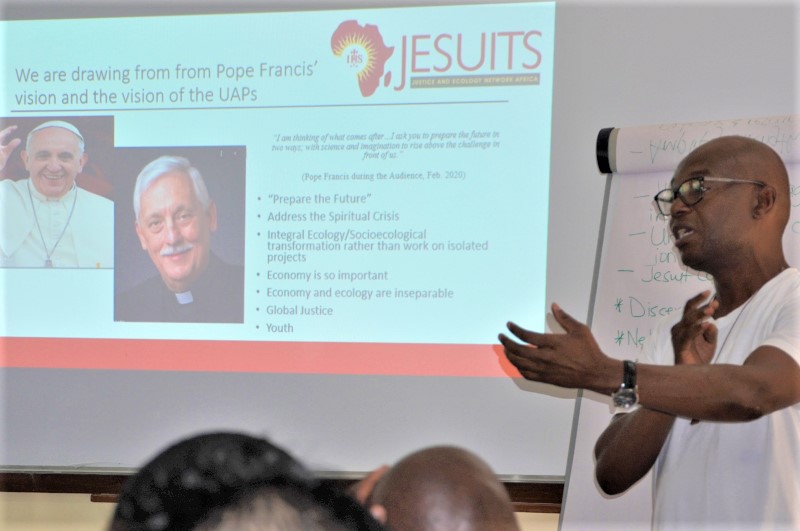

This article is based on the input by Fr. Rampe Hlobo, SJ, the Director, of the Jesuit Justice and Ecology Network (JENA), in one of the panels, during The G20 Interfaith Forum, "Ubuntu in Action: Focus on Vulnerable Communities," held in Cape Town, South Africa.
In today’s interconnected world, global finance is far more than a web of markets and transactions. It is a powerful architecture that shapes the well-being of people, determines access to opportunities, and influences resilience in times of crisis. Yet, this system is marked by glaring inequalities, debt dependency, and structural imbalances that too often leave the most vulnerable behind.
As Jubilee Year 2025 approaches, a unique ethical lens invites us to reimagine this reality. Drawing inspiration from the biblical tradition of Jubilee and the African philosophy of Ubuntu, we are challenged to envision a financial order not driven by profit but grounded in equity, dignity, and relational solidarity.
At its core, Jubilee offers a radical moral vision. Rooted in the Book of Leviticus, it proclaims renewal through debt forgiveness, the restoration of land, and liberation for the oppressed. Pope Francis has brought fresh urgency to this call, framing Jubilee 2025 as a mandate for integral justice, a justice that keeps the human person, particularly the poor and displaced, at the center. Its ethical foundations are clear: human dignity must be non-negotiable, solidarity must transcend borders and generations, inclusion must ensure that no one is left behind, and debt forgiveness must become a concrete act of mercy and justice for nations burdened by unsustainable obligations.
Reimagining finance also requires a shift from equality to equity. True justice in the financial sphere acknowledges historical injustices, unequal starting points, and entrenched systemic barriers. It demands structural correction rather than the pretense of neutrality. This means ensuring representation for marginalized voices in institutions like the IMF and World Bank, pursuing redistribution through fair taxation and debt cancellation, expanding access to inclusive financial services for those excluded from traditional banking, and enforcing accountability on institutions whose practices deepen inequality and environmental harm.
The philosophy of Ubuntu deepens this vision. Against the backdrop of global finance dominated by individualism and accumulation, Ubuntu reminds us of our interconnectedness: “I am because we are.” It reframes economics as a tool for collective flourishing. Ubuntu encourages cooperative savings models, ethical investment, and ecological integrity, all grounded in a conviction that no life is disposable and that community well-being is inseparable from human dignity.
This ethic becomes particularly urgent when viewed through the plight of displaced people. Our time is marked by unprecedented forced migration caused by conflict, climate change, and economic injustice. Yet displaced communities are too often excluded, denied access to banking for lack of documentation, trapped in exploitative remittance systems, and left vulnerable by international policies that feed the very crises that uproot them. An equitable system must address these injustices head-on, granting migrants the tools to live with dignity and agency.
Charting a pathway to reform requires commitment at multiple levels. Policy must advance debt cancellation for nations weighed down by pandemic and climate costs, create funds for loss and damage compensation, and develop inclusive digital finance for undocumented populations. Global institutions must be reformed to grant the Global South a stronger voice in decision-making. At the same time, civil society has a critical role to play: faith communities must bear prophetic witness to financial justice, and social movements must continue to demand economies that place care above profit and community above capital.
Jubilee Year 2025 is thus both a spiritual mandate and a political opportunity. It can become a turning point for justice, a chance to reshape financial systems around equity, solidarity, and human dignity. Guided by the spirit of Jubilee and the wisdom of Ubuntu, the world can chart a course toward a financial architecture that serves all of humanity, especially those on the margins. But this Jubilee must not remain symbolic. It must mark a decisive historical shift, when the global community finally chooses people over profit, justice over dominance, and reconciliation over exclusion.
Related Articles








Select Payment Method
Pay by bank transfer
If you wish to make a donation by direct bank transfer please contact Fr Paul Hamill SJ treasurer@jesuits.africa. Fr Paul will get in touch with you about the best method of transfer for you and share account details with you. Donations can be one-off gifts or of any frequency; for example, you might wish to become a regular monthly donor of small amounts; that sort of reliable income can allow for very welcome forward planning in the development of the Society’s works in Africa and Madagascar.
Often it is easier to send a donation to an office within your own country and Fr Paul can advise on how that might be done. In some countries this kind of giving can also be recognised for tax relief and the necessary receipts will be issued.




